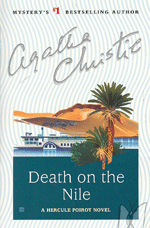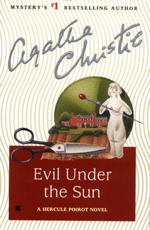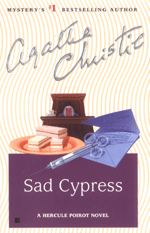Books: An affair with Agatha
Sad Cypress, Evil under the Sun, Death on the Nile, by Agatha Christie



Holding my breath until the very last few pages of an Agatha Christie's book in one straight sitting was something I often did in college and a wonderful experience I most relish. Not all of them were pleasant. For example, once I was reading And Then There were None, the best psychological thriller I've ever read, clumsily adapted by countless copycats in both the literary world and Hollywood, I just couldn't, although very exhausted I was, go to bed. A fear seized me, so dark, so gripping, like a monster hiding in the dark, ready to pounce on me any minute. I was spellbound and glued to my seat. Almost in a trance, my conscience kept telling me to break away, but I just couldn't put down the book for good. I had to wake up my dear old roommate, who grudgingly stayed awake while I hurriedly finished the book.
In my early days of reading Agatha Christie, I tried many times to beat her to the punch, trying to solve the mystery before the end of the book. All of them failed parlously needless to say. That's why I was so very moved by Paul in the Rule of Four. Of course, her works, as fine as they were, cannot compare to the Hypnerotomachia Poliphil in terms of complexity in the deliberate riddles and codes the author employed in guarding the remaining wealth of the entire western civilization. However, Paul's curiosity, devotion and the drive brought back fond memories of my own youth. I used to clear up my desk, take notes page by page, chart family trees, make diagrams for seating arrangements or that of the murder scene, and even go so far as to writing down all the clues and assign them to individual characters. I would talk in length to anyone who would listen about my theories, assumptions, hidden connections among characters. But mostly it's a one-person job for my roommate got tired of my raves and rants pretty fast and threatened to reveal the ending if I didn’t carry out my "second hand detective work" elsewhere… A book usually took me about a week, sometimes two weeks to finish. Like I said I never succeeded and I was always wrong in guessing whodunit. However my favorite time was always when Piorot ties the loose end in long monologues, when the truth was revealed and every clue was placed in its proper place and time. I often read these pages and reviewed my notes at the same time. Viola! I felt as though somehow I participated in Poirot or Marple's investigation and I, too enjoy the victory like a delicious ice cream cone.
Once too frustrated with my own failures, I did the unthinkable. I flipped to the very last page of The Murder on the Orient Express, and quickly cast a glance at a character to which Poirot said something equivalent to that of "I knew you did it". I started working backwards, still maintaining my meticulous ways of charting, noting and diagramming, hoping to see a clear path pointing to this unlikely suspect. Thinking I finally figured it out, I read on to the last few pages. As you can imagine, how disappointed I was. I was wrong again!
I remain a faithful reader of Agatha Christie after college. I tried to read one or two of her books every year although I no longer have the time and patience to get so involved in "solving" the case. I love the ways she always instill complex traits to her characters, yet at same time they are all human with flaws. My diligent research told me, it's never what meets the eye, and that every clue serves its purpose. I have to say, my skills in documenting clues were unparallel, but it's the "threading" that is always challenging. How do they fit into a character's sequence of actions? With crossing timelines and multiple characters cast in suspicious lights, it's nearly impossible.
Evil under the Sun totally caught me by surprise, leaving me the all-too-familiar rug-pulled-under-you kind of feeling. But afterwards, I did think there was a faint recollection of a somewhat similar plot in Death on the Nile in obscuring the exact time of murder. I also felt I have gradually become better, or shall I say, more familiar with Agatha's bag of tricks. My success with Sad Cypress is one prime example. An illegitimate child and the weird incident of Mary being persuaded to draft her own will are two important clues I held on to, never letting other sprinkled clues influence me otherwise. My instinct was correct, although she still threw in road blocks to cloud my judgment. A new sense of appreciation grew for Agatha Christie as she also exemplifies her forte in writing court room drama with such brutal force and legal precision, as seen in the wonderful To Kill a Mockingbird. Furthermore I never cease to amaze at her ability to bring our essence of a character by just a few random comments made by other irrelevant characters. For example, in describing one of the gossipy nurses, O'Brien, Dr. Lord said, "… harmless. She doesn't lie but has the tendency to stretch the truth to make a good story." Dead-on impression of a village gossiper! Bravo.



Holding my breath until the very last few pages of an Agatha Christie's book in one straight sitting was something I often did in college and a wonderful experience I most relish. Not all of them were pleasant. For example, once I was reading And Then There were None, the best psychological thriller I've ever read, clumsily adapted by countless copycats in both the literary world and Hollywood, I just couldn't, although very exhausted I was, go to bed. A fear seized me, so dark, so gripping, like a monster hiding in the dark, ready to pounce on me any minute. I was spellbound and glued to my seat. Almost in a trance, my conscience kept telling me to break away, but I just couldn't put down the book for good. I had to wake up my dear old roommate, who grudgingly stayed awake while I hurriedly finished the book.
In my early days of reading Agatha Christie, I tried many times to beat her to the punch, trying to solve the mystery before the end of the book. All of them failed parlously needless to say. That's why I was so very moved by Paul in the Rule of Four. Of course, her works, as fine as they were, cannot compare to the Hypnerotomachia Poliphil in terms of complexity in the deliberate riddles and codes the author employed in guarding the remaining wealth of the entire western civilization. However, Paul's curiosity, devotion and the drive brought back fond memories of my own youth. I used to clear up my desk, take notes page by page, chart family trees, make diagrams for seating arrangements or that of the murder scene, and even go so far as to writing down all the clues and assign them to individual characters. I would talk in length to anyone who would listen about my theories, assumptions, hidden connections among characters. But mostly it's a one-person job for my roommate got tired of my raves and rants pretty fast and threatened to reveal the ending if I didn’t carry out my "second hand detective work" elsewhere… A book usually took me about a week, sometimes two weeks to finish. Like I said I never succeeded and I was always wrong in guessing whodunit. However my favorite time was always when Piorot ties the loose end in long monologues, when the truth was revealed and every clue was placed in its proper place and time. I often read these pages and reviewed my notes at the same time. Viola! I felt as though somehow I participated in Poirot or Marple's investigation and I, too enjoy the victory like a delicious ice cream cone.
Once too frustrated with my own failures, I did the unthinkable. I flipped to the very last page of The Murder on the Orient Express, and quickly cast a glance at a character to which Poirot said something equivalent to that of "I knew you did it". I started working backwards, still maintaining my meticulous ways of charting, noting and diagramming, hoping to see a clear path pointing to this unlikely suspect. Thinking I finally figured it out, I read on to the last few pages. As you can imagine, how disappointed I was. I was wrong again!
I remain a faithful reader of Agatha Christie after college. I tried to read one or two of her books every year although I no longer have the time and patience to get so involved in "solving" the case. I love the ways she always instill complex traits to her characters, yet at same time they are all human with flaws. My diligent research told me, it's never what meets the eye, and that every clue serves its purpose. I have to say, my skills in documenting clues were unparallel, but it's the "threading" that is always challenging. How do they fit into a character's sequence of actions? With crossing timelines and multiple characters cast in suspicious lights, it's nearly impossible.
Evil under the Sun totally caught me by surprise, leaving me the all-too-familiar rug-pulled-under-you kind of feeling. But afterwards, I did think there was a faint recollection of a somewhat similar plot in Death on the Nile in obscuring the exact time of murder. I also felt I have gradually become better, or shall I say, more familiar with Agatha's bag of tricks. My success with Sad Cypress is one prime example. An illegitimate child and the weird incident of Mary being persuaded to draft her own will are two important clues I held on to, never letting other sprinkled clues influence me otherwise. My instinct was correct, although she still threw in road blocks to cloud my judgment. A new sense of appreciation grew for Agatha Christie as she also exemplifies her forte in writing court room drama with such brutal force and legal precision, as seen in the wonderful To Kill a Mockingbird. Furthermore I never cease to amaze at her ability to bring our essence of a character by just a few random comments made by other irrelevant characters. For example, in describing one of the gossipy nurses, O'Brien, Dr. Lord said, "… harmless. She doesn't lie but has the tendency to stretch the truth to make a good story." Dead-on impression of a village gossiper! Bravo.
Labels: books

0 Comments:
Post a Comment
<< Home